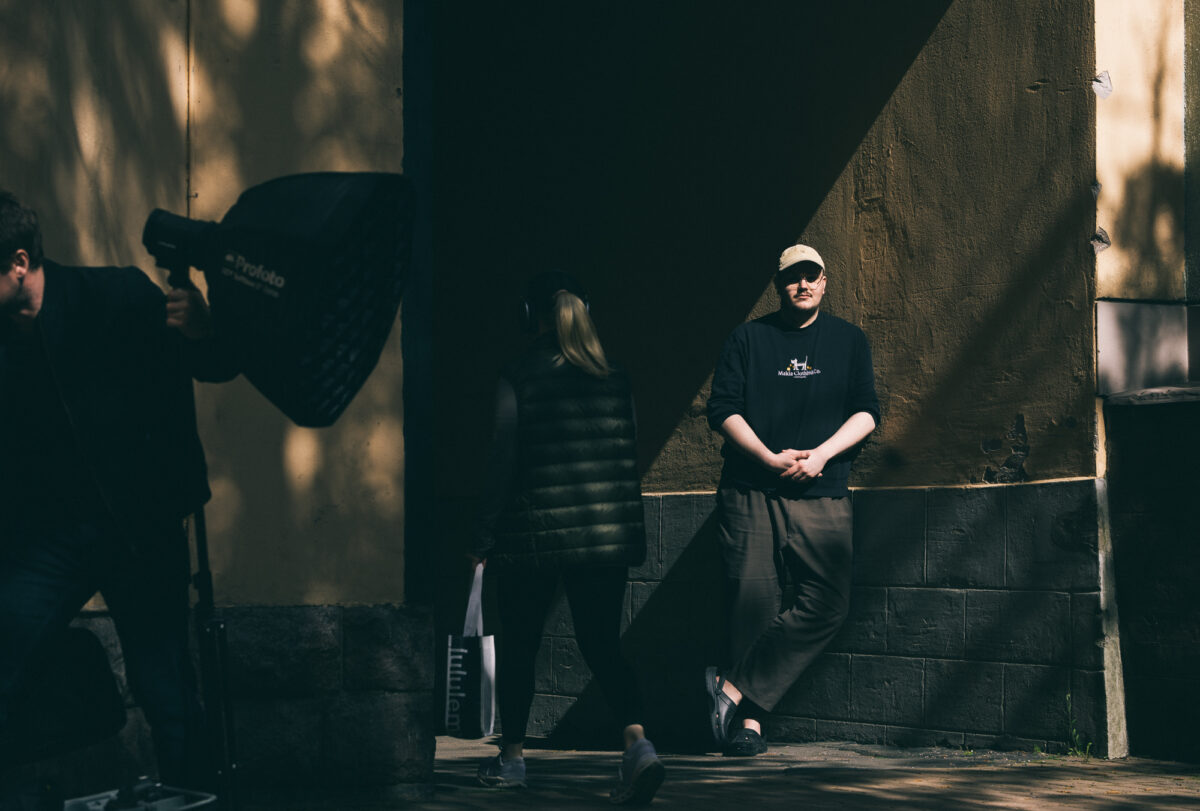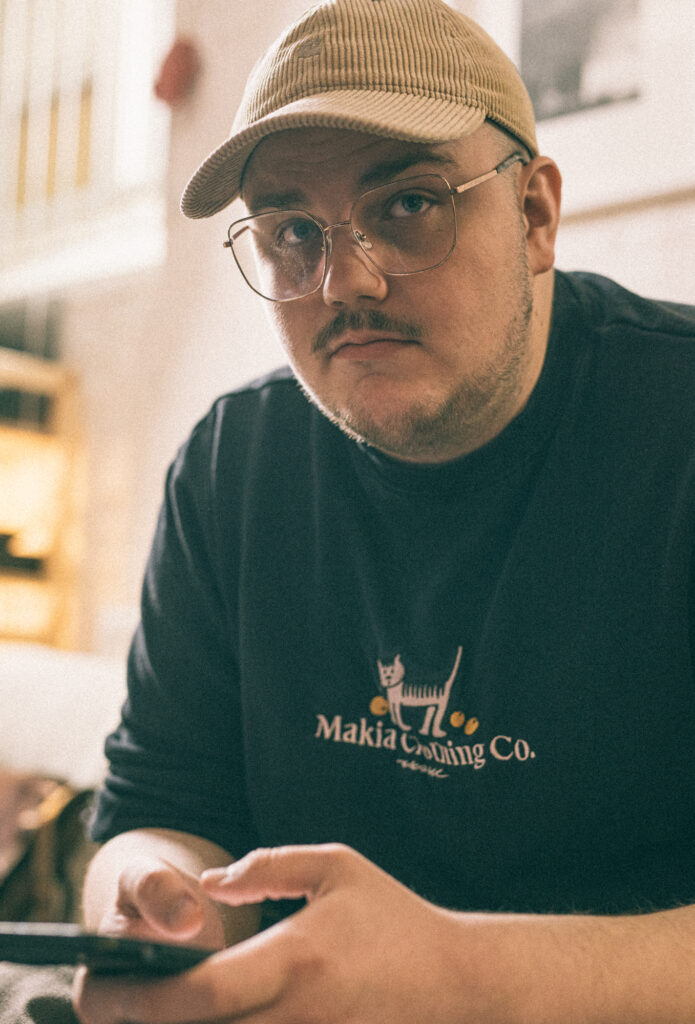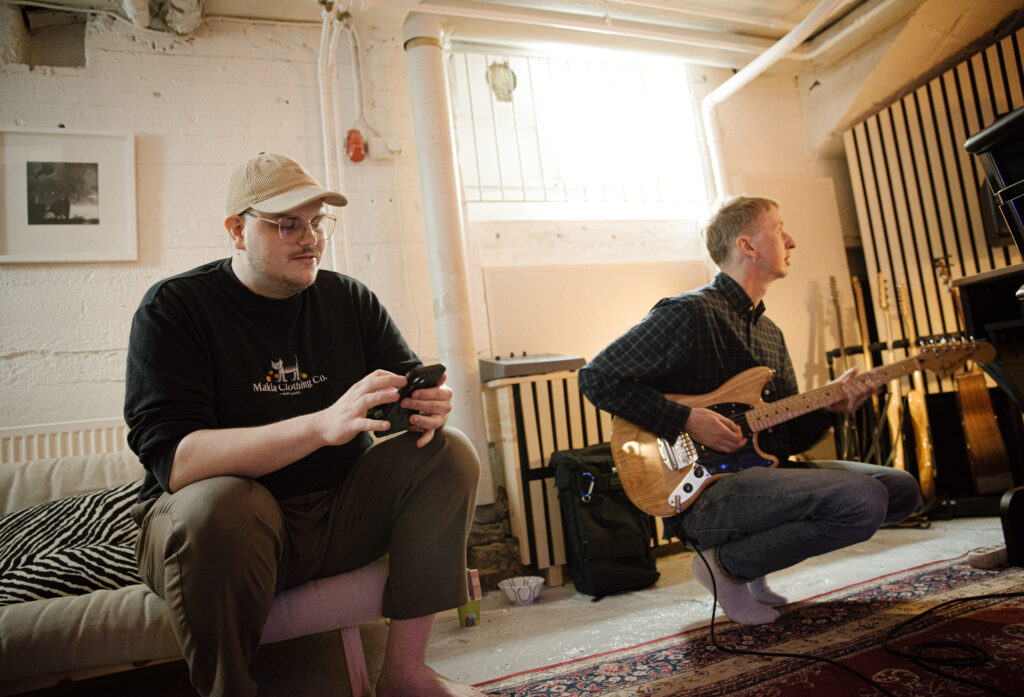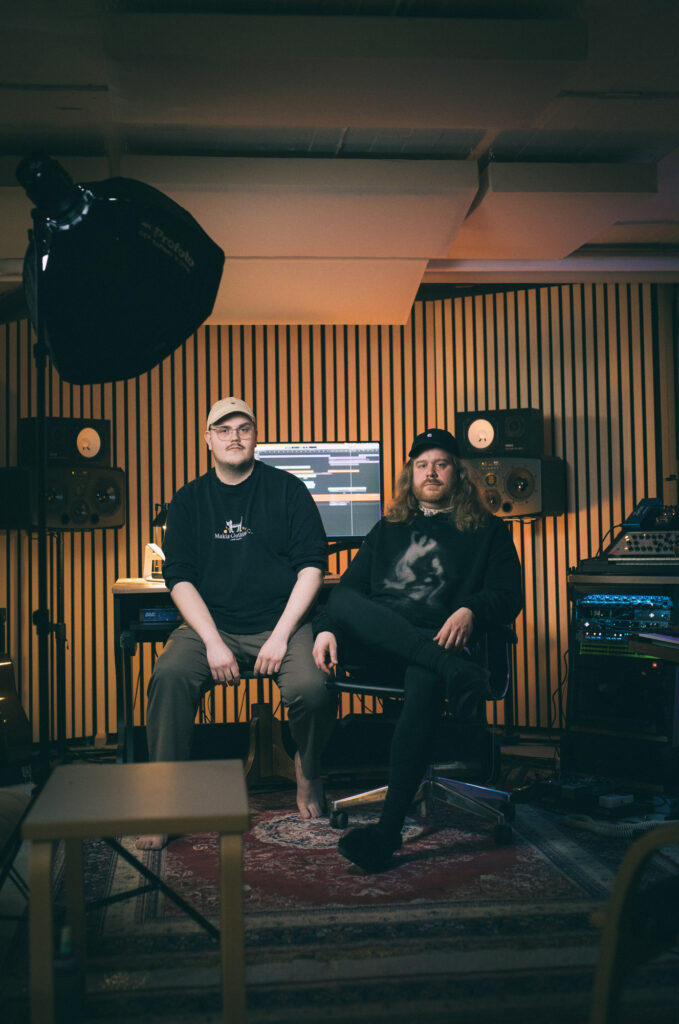
Alpo Nummelin urges Kyösti Salokorpe to get his boxers.
Salokorpi finds a pair of Calvin Klein’s olive green pants in the corners of the studio, sits down on the carpet and starts shoving his underpants between the strings of the electric guitar and the floor.
Aksel Kankaanranta is sitting on the sofa and writing lyrics to a song on his phone. Salokorpi helps with the ideas:
“A bit of Born To Run, that kind of storytelling – that it starts from a dead end and then grows out of it.”
Nummelin spins the tape, and Salokorpi plays the theme riff of the song on his guitar.
“Just fine!” Nummelin shouts from the computer over the song. Kankaanranta smiles.
We are in Helsinki at producer and songwriter Alpo Nummelin’s studio. We are working on Aksel Kankaanranta’s debut album.
You could say finally – by all rights Kankaanranta should have released an album years ago. After all, he has such a CV:
Runner-up in the Voice of Finland competition in 2017.
Streamed Song of the Year -Emma award and Song of the Year -Emma award from 2019. The awards came for the song “Jättiläinen”, in which Kankaanranta sang.
A UMK win in 2020, a slot on the Warner Music Finland label’s Etenee sub-brand in the same year and a UMK final spot in 2021.
For eight years Kankaanranta has been in the A-list of Finland’s biggest TV programmes, music galaxies and record companies. How is it possible that an artist who has gathered such stardust has never released an album?
When Aksel Kankaanranta was a child, he hated music, especially singing.
“When my brother sang, it pissed me off. When I was a teenager, all I listened to was Eurobeat and techno, music where you don’t sing,” says Kankaanranta.
Little by little, the dislike subsided, and Kankaanranta was introduced to the music his sister, five years older than him, listened to. There she found guitar and piano indie bands… Coldplay, Keane, War on Drugs…
At the age of 15, Kankaanranta realised he could sing, and a couple of years later his older sister suggested that Kankaanranta enter the Voice of Finland singing competition. Why not, Kankaanranta thought. He had time, as he had given up his vocational school studies in ICT due to burn-out.
The burnout was partly due to untreated ADHD and the fact that Kankaanranta has a form of autism, previously called Asperger’s. For example, what comes naturally to many in social situations or at work can be stressful for Kankaanranta.
The success in Voice of Finland was not hampered by neuroepatypicality. Kankaanranta finished second in the competition.
“The Voice is remembered as a feverish experience. I just went where I was told and did what I was told.”
Kankaanranta had no expectations from the competition.
“I’ve never really had any expectations of anything.”

During the filming of an episode of The Voice, Mikko “Pyhimys” Kuoppala was in the audience. He spotted Kankaanranta’s exceptional singing voice and asked her to sing for his song Jättiläinen. Kankaanranta didn’t even know who Pyhimys was.
“But I thought, why not. I went to the studio with the idea that we’ll see what happens.”
After a two-hour session, the songs were ready. After that, nothing happened. Kankaanranta spent another quiet life unemployed on his sofa at home, occasionally sending out job applications for odd jobs. One day he heard a rap song on the radio with a familiar chorus:
Yksinään me täällä ryömitään
Ei jäätävä tuuli laula meille, se laulaa lähteneille
Ympyrää kuin hyrrät pyöritään
Ja siinä kun mietin mitä mä teen
Oh oh, Kankaanranta thought. It felt really strange: that your voice was playing on the radio, that people were listening to it.
It started to happen.
Father called Kankaanranta and said that he had to join Gramex. It was good advice, as Jättiläinen became the most listened song of 2019 in Finland. Kankaanranta received €4 000 in his first Gramex payment.
“I’ve never had so much money. I wondered what I was doing with it all.”
The festival summer began, and Kankaanranta was dragged from his studio couch to tour Finland’s festivals with Pyhimys. He remembers standing on the beach at Ruisrock. The sun was shining, the sea was rocking and the audience sang along as Kankaanranta sang Jättiläinen.
Ohhoh, he thought again.
Then the summer was over, and Kankaanranta returned to his sofa. He was still unemployed, but had started making music. Kankaanranta sent one song to producer Jukka Immonen to ask what it would take to mix it.
“I asked stupid questions when I didn’t understand anything.”
After a couple of weeks, Immonen returned, but with another song. It was called Looking Back. Immonen asked if Kankaanranta would like to enter the song in the UMK (Contest for New Music).
This year’s UMK reached 2.3 million viewers. That’s the kind of spotlight that Kankaanranta was brought into from the comfort of his own home.
In Tampere, he was driving between his hotel and the Yle studio at a terrific pace during rehearsals. Sometimes he couldn’t sleep because of the tension and the adrenaline rushing through his body. Before the UMK dress rehearsals, Kankaanranta slept for a few hours on the sofa in the side room of the studio. He woke up after a short nap and wondered for a moment where he was. Then he remembered: soon the whole of Finland would be watching him sing.
“I thought, let’s sing then.”
Kankaanranta won the UMK competition. Now he would be taken to Rotterdam for the Eurovision Song Contest. The audience would increase a hundredfold from two million to two hundred million.
“It felt really, really surreal.”
Then came the corona, and the Eurovision Song Contest was cancelled. Kankaanranta was annoyed, but as a consolation prize, he got to watch the contest the following year when he was invited by the Blind Channel. Kankaanranta had met them at the 2021 UMK, where he was a finalist.

Let’s sum up:
Kankaanranta was a winner of giant competitions and a radio hitmaker known throughout Finland, who had worked with Finland’s top composers, artists and producers. He was an exceptionally talented singer.
Success seemed inevitable. Kankaanranta would make an album and become a regular on the main stages of major festivals. In a few years, it might be time for a stadium.
But things turned out differently.
There has not been a single media article about Kankaanranta since 2021. A few funny songs were released under his name, and he appeared on a few songs by other artists.
The exceptional talent, known to all, who had won everything, was left to lie on his couch on the dole.
What on earth happened – or didn’t happen?
Back to the studio in Helsinki. Alpo Nummelin has moved from the machine to the synthesizer. He hits the low synthesizer riff of Pulp’s Common People.
“Something like this?”
Salokorpi and his guitar move to examine the effects pedal (his underwear has been removed from under the floor). What they’re looking for is something Sonic Youth-style, with a distorted feedback sound. When you find it, no one has to say anything – the smiles tell you it’s the right sound.
Nummelin spins the tape again, and Salokorpi plays the guitar. Kankaanranta’s head, sitting on the sofa, starts to nod in rhythm. He taps out the lyrics he has written to the song.
There is an energy in the air that is difficult to put into words. The kind that arises when the three musicians’ brains become swarming for a moment, realising that now this is working, that something really fucking great is about to be born.

Let’s sit on the couch and talk about why Kankaanranta’s debut is being recorded now instead of four years ago.
“It kind of went into limbo,” Kankaanranta says.
When he got a record deal in 2020, he was involved in dozens of songwriting sessions. We tried out different styles of music, made in Finnish and made in English.
We had to find a genre and a target audience for Kankaanranta. The fear is that if the product – book, film, artist – is too complex and sprawling, the customer will not understand what it is about. Then it won’t sell.
At the moment, the box that younger artists in particular like to fit into is the electro-pop or rap box, as there is a demand for these styles of music.
The fabric did not fit in such a box. His roots were in his older sister’s record shelf, in indie rock and pop, with its sonorous piano and gentle guitars.
“The indie aesthetic – what Aksel wants to do – is not really heard anywhere these days. Great songs might be ignored by record companies because they’re not the right genre, which is a terrible shame,” says Alpo Nummelin.
At this point, it would be easy to berate the big, bad record labels who don’t care about music and just want to make money, who want to put the artist in a box on commercial terms. But it’s not that simple, says Kyösti Salokorpi.
“The problem is not with the people who wield power in the Finnish music business. Even the often maligned major labels are full of people who really love good music,” says Salokorpi.
The problem lies in economic laws.
“Every song should be streamed 2 million times, or it’s a hit. In an international label like Warner, the pressure to perform comes from abroad a lot. I understand that very well,” says Salokorpi.
Financial pressures lead to risk aversion, and risk aversion reduces the diversity of the music being released. Work is piling up for established hit producers who produce a certain style of music.
In such an environment, it is possible that the incredibly talented UMK and Emma winner Aksel Kankaanranta will not get an album released. It’s not just a shame, it’s downright criminal – to waste such talent.
The record company did try, Kankaanranta says. But no one seemed to have a clear vision.
“There were probably 50-60 songs made, but they weren’t released. And you didn’t really get any feedback on what to do with them. It felt like no one really took notice of anything,” Kankaanranta says.
He returned to his couch until he was called away again when a record company was set up in Finland, where they wanted to do things differently.
In early 2025, music and media influencer Aki Roukala and former Soundi magazine editor-in-chief Mikko Meriläinen announced that they have founded a record label called Lördag. The idea was to work in many ways in the opposite direction to the Finnish units of multinational record companies.
Mikko Meriläinen says that Lördag fills a gap that has gone unnoticed in the polarised music business: the gap between big hit artists and small artists.
“We felt that between the majors and the small indies, there is a significant number of artistically ambitious and commercially viable artists. Artists whose streaming numbers or profile don’t quite fit into the world of the majors, but who deserve good resources to support their work,” Meriläinen says.
Aksel Kankaanranta received a phone call at the end of 2024 asking him to come to Lördag.
“Aki (Roukala) asked me what kind of record deal I had. It was surprising, I was like, ‘huh’ again. Then he asked Kössi (Kyösti Salokorpi) and Alpo if they would make a record with me – we had already made music together before, so we knew each other. And here we are. We’re aiming to have the album ready next autumn,” says Kankaanranta.
For all three of these, Lördag’s philosophy is a bait in the pan, as Lördag focuses on album compilations rather than individual hits.
The album format is an artistically freer framework.
If, for example, Radiohead had had to operate in the modern hit pressures when making OK Computer, a song like Fitter, Happier would not have been released. If Morrissey had hunted only for hits on Vauxhall And I, he would not have made Lifeguard Sleeping, Girl Drowning.
They are not hits, but they are still great and important songs.

The music playing in the background in Nummelin’s studio, and oh my, how good it sounds – a post-punk polish running on a synthesizer mat, spiced up by a sonorous piano and guitar riff theme.
The song describes despair, or rather how it gradually recedes as a situation that seemed to be a dead end gradually opens up. This is the theme of Kankaanranta’s album.
Three years ago, a good friend of Aksel Kankaanranta committed suicide. Kankaanranta has been dealing with it ever since. Loss, grief, death, the end – and how to move on. Because the more songs Kankaanranta has made with Salokorpi and Nummelin, the more it has seemed that the songs move further away from death.
They will move on.
Kankaanranta’s friend did not get out of his dead end, but by dealing with that dead end Kankaanranta has got out of his. All he, Salokorpi and Nummelin have had to do is to concentrate on the essentials – this is not the kind of music that can be created in a suffocating pressure of hits.
“When I set up this studio a year and a half ago, I wanted it to be a safe and peaceful place. To focus on making good music,” says Alpo Nummelin.
To do that, to make good music, you need time, peace and freedom. And olive green boxers.

